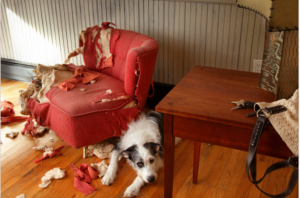Chewing, playing, and exploring are natural and normal dog behavior. However, it can be frustrating and a serious problem for the pet owner when these normal behaviors result in the destruction of household properties.
Destructive behavior in dogs may result from a lack of training or exercise. It may be an indication of a more serious psychological issue. Some dogs may engage in indestructive behavior as an outlet for excess energy or just to relieve anxiety.
Some common Destructive Behaviours in Dogs
- Chewing furniture, clothes, shoes, carpets, household items
- Digging holes in the compound
- Barking unnecessarily
- Other unusual acts that are destructive in nature.
- Destroying door flames, curtains, windows
- Eating objects that are not food such as flowers, plants, rock
- Urinating and defecting at the wrong places
- Garbage raiding
- Jumping.
- Pacing in a circular fashion or walking back and forth in a straight line
Causes of Destructive Behavior in Dogs
Teething: puppies’ gums cause a discomforting sensation while they are teething. This discomfort is usually lessened by chewing. The habit normally ends once permanent teeth develop.
Normal play behavior: Most unsupervised dogs or dogs without sufficient outlets for appropriate play often exhibit destructive play behavior which frequently involves digging or gnawing, tearing, and shaking of toys-like objects, like socks, shoes
Separation Anxiety: Most dogs acquired from rescue organizations who have previously undergone trauma or adult dogs used to spending all of their time with their owner adjusting to a new schedule frequently exhibit separation anxiety, which is caused by hper-attachement of the dog to its owner. When a dog gets anxious about being left alone, it may destroy the owner’s belongings, whine, or bark nonstop.
Situations that may cause separation anxiety in dogs include a change in the family’s schedule that causes the dog to be left alone more frequently, a transfer to a new home, the death or loss of another family pet, or a stay at a boarding kennel.
Investigative Behaviour: Dogs are investigative and exploitative in nature. If left unsupervised for a long time, they may unintentionally destroy objects in their environment while exploring or investigating items that they are not familiar with. Dogs explore items by pawing at them and using their lips. In this manner, they may end up tearing books or destroying flower vases, or other decorative objects.
Lack of exercise: Lack of exercise or proper training can result in a dog with excess energy and/or the inability to resist destroying property.
Emulation: Dogs are smart, they quickly comprehend some scenes they watch on television and tend to practice along. when a dog for instance is watching another dog on television jumping or playing, it may be moved to jump or play along which consequently results in destroying items around its surroundings at the moment.
Fears: Dogs may act destructively while trying to cope with loud noises or thunderstorms. When the fear is triggered, dogs can shiver, hide, pant, or pace. Then, in an effort to calm itself or get a place it believes is secure, the dog might damage things.
Boredomness: When dogs are bored as a result of inadequate opportunities for social interaction with their owners, other dogs the environment, they relieve themselves by entertaining themselves with activities that may end up destroying properties. A bored dog may bite its plate, or bite its toys or any object around it.
Medical Condition: Dogs may exhibit destructive behavior as a result of certain medical conditions which may include discomfort, dental issues, allergies, pains, and so on.
How to Prevent Destructive Dog Behavior
- Put valuable items away from the dog’s reach
- Ensure your dog gets adequate physical exercise
- Supervise and guide your dog to encourage proper behavior
- Socialize your dog with other dogs and the environment
- Ensure regular and proper training of your dog to provide mental stimulation
- Provide your dog with sufficient play toys
- Address any underlying cause of anxiety or fear
- Avoid punishing your dog.
- Call for professional assistance
In order to prevent or address destructive behavior in dogs, it is paramount that a dog owner first identifies the primary cause of the destructive behavior. It is also important to note that dogs do not engage in destructive behavior as revenge. It is therefore not appropriate to punish a dog when it destroys properties. Consistency and patience in corrective and preventive measures will go a long way in bringing your dog back to normal behavior.



